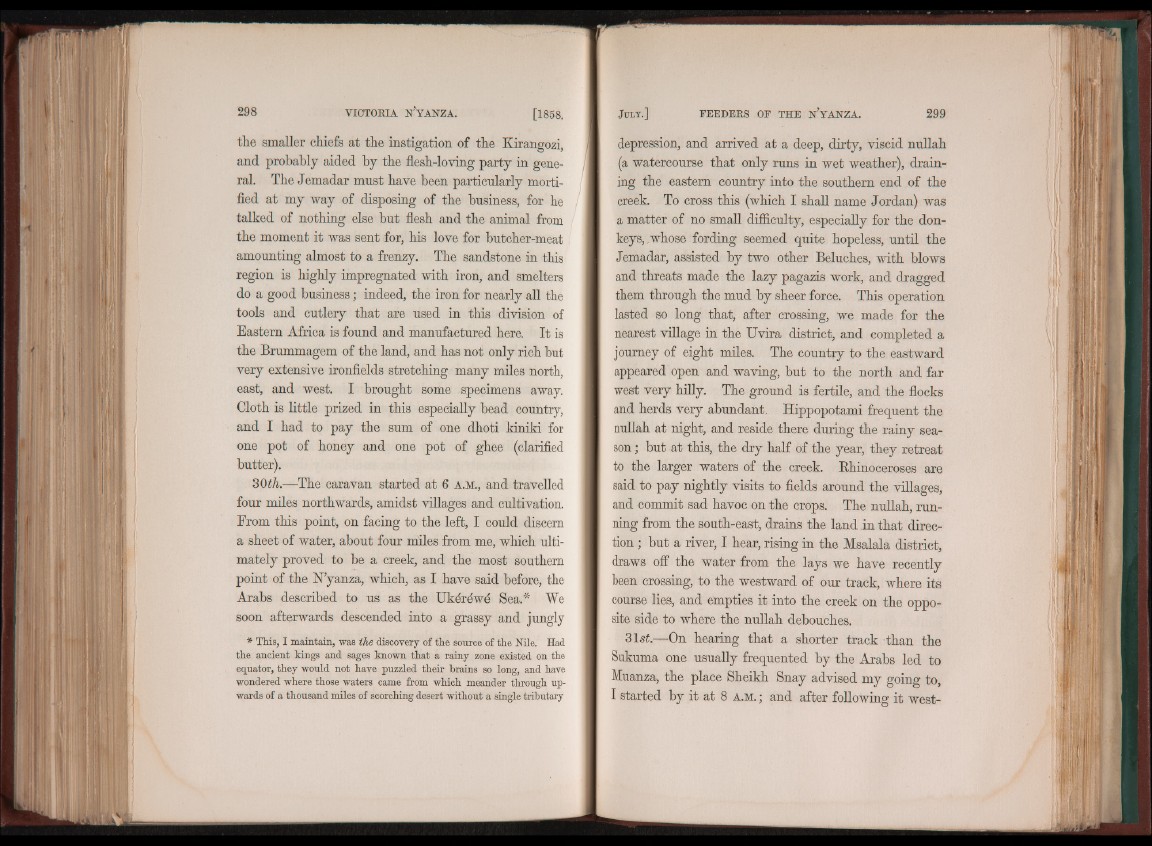
the smaller chiefs at the instigation of the Kirangozi,
and probably aided by the flesh-loving party in general.
The Jemadar must have been particularly mortified
at my way of disposing of the business, for he
talked of nothing else but flesh and the animal from
the moment it was sent for, his love for butcher-meat
amounting almost to a frenzy. The sandstone in this
region is highly impregnated with iron, and smelters
do a good business; indeed, the iron for nearly all the
tools and cutlery that are used in this division of
Eastern Africa is found and manufactured here. It is
the Brummagem of the land, and has not only rich but
very extensive ironfields stretching many miles north,
east, and west. I brought some specimens away.
Cloth is little prized in this especially bead country,
and I had to pay the sum of one dhoti kim'ki for
one pot of honey and one pot of ghee (clarified
butter).
30th.—The caravan started at 6 A.M., and travelled
four miles northwards, amidst villages and cultivation.
From this point, on facing to the left, I could discern
a sheet of water, about four miles from me, which ultimately
proved to be a creek, and the most southern
point of the N’yanza, which, as I have said before, the
Arabs described to us as the Ukdrewe Sea.* We
soon afterwards descended into a grassy and jungly
* This, I maintain, was the discovery of the source of the Nile. Had
the ancient kings and sages known that a rainy zone existed on the
equator, they would not have puzzled their brains so long, and have
wondered where those waters came from which meander through upwards
of a thousand miles of scorching desert without a single tributary
depression, and arrived at a deep, dirty, viscid nullah
(a watercourse that only runs in wet weather), draining
the eastern country into the southern end of the
creek. To cross this (which I shall name Jordan) was
a matter of no small difficulty, especially for the donkeys,
.whose fording seemed quite hopeless, until the
Jemadar, assisted by two other Beluches, with blows
and threats made the lazy pagazis work, and dragged
them through the mud by sheer force. This operation
lasted so long that, after crossing, we made for the
nearest village in the Uvira district, and completed a
journey of eight miles. The country to the eastward
appeared open and waving, but to the north and far
west very hilly. The ground is fertile, and the flocks
and herds very abundant. Hippopotami frequent the
nullah at night, and reside there during the rainy season
* but at this, the dry half of the year, they retreat
to the larger waters of the creek. Rhinoceroses are
said to pay nightly visits to fields around the villages,
and commit sad havoc on the crops. The nullah, running
from the south-east, drains the land in that direction
; but a river, I hear, rising in the Msalala district,
draws off the water from the lays we have recently
been crossing, to the westward of our track, where its
course lies, and empties it into the creek on the opposite
side to where the nullah debouches.
31si.—On hearing that a shorter track than the
Sukuma one usually frequented by the Arabs led to
Muanza, the place Sheikh Snay advised my going to,
I started by it at 8 a.m. ; and after following it west